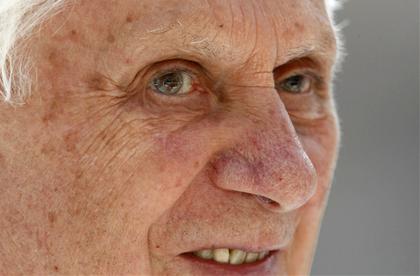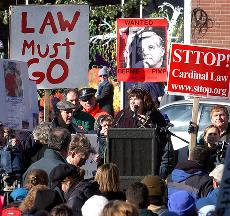USA Today
June 14, 2010
http://content.usatoday.com/communities/Religion/post/2010/06/catholic-abuse-scandal-pope-benedict-media-pew-forum/1
[The Pew Forum on Religion and Public Life]
 |
| Pope Benedict XVI, who has repeatedly apologized and asked forgiveness for the clergy sexual abuse scandal, is the focus of most mainstream and Catholic media coverage of the scandal, a new study finds. |
Are you "over" the Catholic sex abuse scandal? Does it seem to you that nothing new -- or sufficient -- is being done and so you have a hard time reading more about it?
A new study examines major mainstream and Catholic media coverage of the clergy sexual abuse crisis during peak news months this spring as the scandal became headline news in Europe. The most interesting points are two:
First, it shows, no surprise, about half of all the stories focused on Pope Benedict XVI and his handling of abuse allegations before he was elected in 2005 all the way back to his days as an archbishop in Germany.
During the six-week period from March 12 through April 27, Pope Benedict XVI was a major focus of more than half the stories on the scandal in the mainstream U.S. media, including print, radio, network television, cable TV and online news sources.
And this coverage has been "toxic for Benedict's image" according to the study.
In a nationwide poll released by the Pew Research Center in April, for example, just 12% of the public said the pope has done a good or excellent job addressing the scandal, down from 39% two years earlier. About seven-in-ten Americans (71%) said Benedict has done a poor or only fair job, up from about half (48%) who felt that way in 2008.
The study was sponsored by the Project for Excellence in Journalism and the Pew Forum on Religion & Public Life, both part of the Pew Research Center in Washington, D.C. It cites all the stats for stories and blog posts (Note: Faith & Reason tied the Washington Post with 12 posts on the topic during the time studied).
 |
| In December 2002, at the height of the clergy sex abuse crisis in the USA, an estimated 400 people protested outside Cathedral of the Holy Cross in Boston, calling for the resignation of Cardinal Bernard Law. He stepped down as archbishop of Boston later that month. A new study finds the focus of media coverage on the scandal is now in Europe. |
Secondly, the study finds that in 2002, when the heart of the story was in the USA, it captured more attention from U.S. media and now that the story is overseas, centered with the the pope, the Vatican and it's slow, so-far ineffective actions to quell the scandal, the European press leads in volume of coverage.
It may be the most telling numbers in the report are not the detailed scores for the number of stories or posts but the yawns this coverage is drawing from U.S. readership. The report notes:
The scandal found little traction in new media, however. Across the millions of blogs and Twitter posts tracked in PEJ's weekly monitoring, the clergy abuse scandal registered as a leading topic in only one of the six weeks analyzed. During the week of March 29-April 2, when new information emerged about the Milwaukee archdiocese's handling of an abusive priest, the scandal was the second-largest story, making up 9% of all Twitter links to news reports. But it did not rank in the top five most blogged-about news stories at all.
What's not answered in the analysis: What's too much coverage or too little? How can they compare the nature and volume of U.S. media coverage of international news with the coverage in the white-hot peak of the scandal in the USA in spring 2002? While the study offers a comprehensive headline count, there's no examination of the relative quality of the coverage? Fair? Accurate? Accessible? Influential?
Is the lack of interest among online readers a sign that the by-and-large younger readership is less interested in this or that print and broadcast news consumers are also less interested? Is this due more to our fickle attention to long-simmering news stories when hot new stuff (the BP oil spill, Stephen Strasburg's pitching, the 2010 election campaign season heating up, Carly Fiorina's hair-pull with Barbara Boxer) distracts us?
So I'm back to my original question: Are you "over" reading up on this?
Any original material on these pages is copyright © BishopAccountability.org 2004. Reproduce freely with attribution.